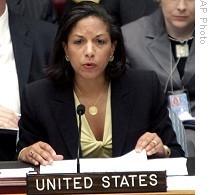Washington
29 July 2009
 |
| U.S. United Nations Ambassador, Susan Rice |
Ambassador Rice said the Obama administration is moving ahead on several fronts to support peacekeeping, including working with Security Council members on a better process of formulating credible and achievable mandates for U.N. operations.
The United States is contributing $2.2 billion of a $7.8 billion U.N. peacekeeping budget for 2009.
Rice said the United States strongly supports reforms that will save money, strengthen oversight, transparency, accountability and planning, reduce deployment delays, and prevent fraud and abuse, including a zero tolerance policy on sexual exploitation by peacekeepers. "It [rape as a crime of war] is prevalent in Congo and Liberia, Sudan and elsewhere. And these need to be addressed in a very serious way when they are committed by combatants as well as peacekeepers," she said.
The situation in Somalia, as well as challenges facing U.N. peacekeepers in Sudan's Darfur region, emerged as a key a focus of questioning by lawmakers on the House of Representatives Committee on Foreign Affairs.
Rice said the ability of the U.N. force in Darfur to do its job has been made worse by the Khartoum government denying access to and expelling humanitarian workers and blocking delivery of critical support.
"While President [Barack] Obama's special envoy on Sudan, General Scott Gration, helped persuade the government of Sudan to let four new humanitarian NGO's [non-governmental organizations] in, we continue to urge Khartoum to fill the gaps in critical humanitarian aid services and to improve its cooperation with UNAMID," she said.
The United States has provided humanitarian aid, as well as 80 tons of military support to the Somalia Transitional Federal Government in Mogadishu. Rice said the United States has an enormous stake in the survival of that administration and the "defeat of al-Shabaab" and other extremists groups affiliated with al-Qaida.
Rice also had some sharp criticism for Eritrea, which she said is arming, supporting and funding al-Shabab and helping to destabilize Somalia and the region with a direct impact on U.S. security.
Ambassador Rice signaled that Eritrea could face international action, including sanctions, if it does not change its behavior in Somalia.
"As I said in New York, there is a very short window for Eritrea to signal, through its actions, that it wishes a better relationship with the United States and the wider international community. If we do not see signs of that signal in short order, I can assure you that we will be taking appropriate steps with partners in Africa and the Security Council to take cognizance of Eritrea's actions both in Somalia and the wider region," she said.
Rice said the United States does not support a U.N. peacekeeping mission in Somalia, saying the African Union force is the best approach at present because it has been largely accepted by the population there.
In Wednesday's hearing, House Committee on Foreign Affairs Chairman Howard Berman said it is in America's interest to support U.N. peacekeeping. But he also posed this question.
"Is the international peacekeeping system, as it is conceived today, capable of preventing genocide, ethnic cleansing and other mass atrocities, or do we need to develop an entirely new model for our increasingly complex world?"
In addition to challenges facing U.N. operations in Darfur, Ambassador Rice said missions in Chad and Congo also lack critical equipment, such as helicopters, needed to help vulnerable civilians.
Ambassador Rice cited Liberia as an example of the importance of U.N. peacekeeping, saying hard-won progress there could unravel if peacekeepers leave too soon because of continuing weaknesses in the army, police and justice systems.
In Haiti, Rice said the Obama administration supports extending the U.N. mission, which she said is "on track and well-led," at least until upcoming elections and hopes that the involvement of former President Bill Clinton, who is the U.N. special envoy to Haiti, will help contribute to that nation's economic health and stability.